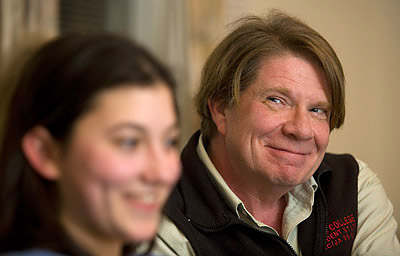Reason and Rhyme
Rob Farnsworth has just won the Kroepsch Award for Excellence in Teaching, but today he feels ill so he phones to ask if we might delay our morning interview. “I hope this doesn’t throw sand in the wheels,” says Farnsworth, a writer-in-residence at Bates since 1990.

Rob Farnsworth smiles during a poetry reading and discussion convened by chaplain Bill Blaine-Wallace, part of a series exploring the role of passion and engagement. Chloe Viner ’09 of Rowley, Mass., is at left. Photograph by Phyllis Graber Jensen.
The cliché is effective, acknowledging his concern for process. But after the recuperative postponement, I have to ask Farnsworth if a student of his could effectively use such a cliché, straightforward and without irony, in a piece of fiction or poetry.
No, he says, but then offers how a grad school professor at Columbia did once talk about rescuing clichés “by following them back to their literal roots. In some cases they can be excavated and played with. But that demands a willingness to play around in the sandpit that is the cliché.”
I smile; Farnsworth has reintroduced “sand” in a way that’s both sly and, importantly, instructive: the craft of writing isn’t sandbox stuff.
When I arrive in his Pettigrew office, the slightly flushed-with-fever Farnsworth is staring at his bookshelf as if trying to find a star in a suddenly jumbled sky. “I’m looking for a book,” he says to the wall. “I know what its spine looks like…but I long ago stopped trying to keep my books in alphabetical order.”
Now, most every professor has a well-used bookshelf, but you can easily imagine books leaving Farnsworth’s shelves like blocks at the beginning of a Jenga game, for reading is the cornerstone habit that Farnsworth demands from his writing students. The apprentice writer must read “omnivorously,” he says, because the motivation to write seriously should “come from wanting to participate in the spellcasting that reading makes you aware of. It should make you say, ‘I want to add my voice to that. I want to sing along with that, descant with that.’”
Craig Teicher ’01 is one of two young-alum spellcasters and former Farnsworth protégés who won first-book prizes in 2007. He received the Colorado Prize for Poetry for Brenda is in the Room and Other Poems, while Gabe Fried ’96 won the Kathryn A. Morton Prize for Making the New Lamb Take.
Both express an appreciation for Farnsworth that borders on wonderment. “My life as it is wouldn’t exist except for Rob,” says Fried, an editor at Persea Books in New York City.
Teicher, also an editor in New York City (at Publishers Weekly, where he’d just interviewed novelist Elizabeth Strout ’77 about her new book, Olive Kitteridge), arrived at Bates trailing a belief in the communal and communional power of poetry. “My family bottomed out a bit in high school,” he recalls. “In poetry I found companionship and something to identify with.” Farnsworth, right from his first meeting with Teicher, noticed how “earnest” his student was about “what poetry could do. He came with that inkling.” Farnsworth says that he and others were merely “operating the bellows” to fan Teicher’s creative flames.
I share the bellows quote with Teicher, who e-mails me back: “Rob’s being modest. He was my gatekeeper to the ways one could actually participate in literature.” Later, on the phone, he explains. “Here was a guy who, if I said something intelligent in class, was going to come back with something more intelligent that pushed the conversation further with other students, making it bigger and bigger.
“All of a sudden, literature was personal and exciting.”
Farnsworth, who majored in English at Brown and earned an M.F.A. at Columbia, teaches workshop courses in writing at Bates in addition to literature courses, including one on modern Irish poetry this past winter. “Rob isn’t a Ph.D. scholar kind of guy,” says Teicher. “He’s a practicing reader and writer, and you’re not going to find a guy who has, for example, an earthier, more intimate knowledge of 20th-century Irish poetry. He knows what’s in the bones of it.”
Widely published, Farnsworth is highly regarded in Maine for his many appearances as a poet, scholar, and facilitator for literary gatherings in small towns and cities.
But there’s more. Teicher and Fried especially praise the restraint in Farnsworth’s mentorship. “He was really good about being cautious and making me aware how hard it is to have a successful career as a poet,” Teicher says. “Rob understood that my college wish to be a poet was very much about my fantasy life, and he didn’t want to be a creature in my fantasy life. Once I was older, and was an adult, he was excited about treating me like one.”
Says Fried, “Rob allowed us to explore our ambitions while making sure we could live with our shortcomings.”
Farnsworth reads and discusses his poetry www.fishousepoems.org
By H. Jay Burns


